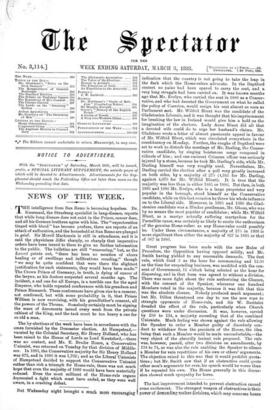But Wednesday night brought a much more encouraging
indication that the country is not going to take the leap in the dark which the Home-rulers advocate. In the Deptford contest no pains had been spared to carry the seat, and a very long struggle had been carried on. It was known months ago that Mr. Evelyn, who carried the seat in 1886 as a Conser- vative, and who had deserted the Government on what he called the policy of Coercion, would resign his seat almost as soon as Parliament met. Mr. Wilfrid Blunt was the candidate of the Gladstonian Liberals, and it was thought that his imprisonment for breaking the law in Ireland would give him a hold on the imagination of the electors. Lady Anne Blunt did all that a devoted wife could do to urge her husband's claims. Mr. Gladstone wrote a letter of almost passionate appeal in favour of Mr. Wilfrid Blunt, which was circulated everywhere in the constituency on Monday. Further, the roughs of Deptford were set to work to disturb the meetings of Mr. Darling, the Conser- vative candidate, by singing boisterous songs composed in ridicule of him ; and one eminent Crimean officer was seriously injured by a stone, because he took Mr. Darling's side, while Mr. Darling himself was very roughly used. Nevertheless, Mr. Darling carried the election after a poll very greatly increased on both sides, by a majority of 275 (4,345 for Mr. Darling, against 4,070 for Mr. Wilfrid Blunt). It is true that the majority was less than in either 1885 or 1886. But then, in both 1885 and 1886 Mr. Evelyn, who is a large proprietor and very popular in the borough, stood himself as the Conservative candidate, while on this last occasion he threw his whole influence on to the Liberal side. Moreover, in 1885 and 1886 the Glad- stonian candidate was a Hindoo gentleman, Mr. Ghose, who was by no means the most popular of candidates ; while Mr. Wilfrid Blunt, as a martyr actually suffering martyrdom for the Parnellite cause, was certainly as likely to excite the enthusiasm of the genuine Home-rulers as any Home-ruler could possibly be. Under these circumstances, a majority of 275 in 1888 is more significant than either the majority of 627 in 1885 or that of 367 in 1886.


































